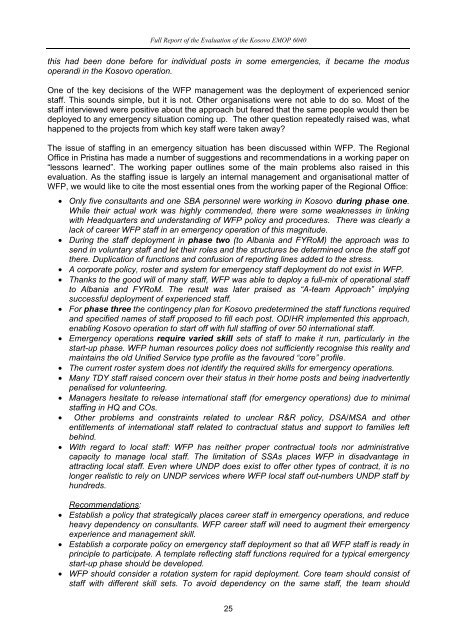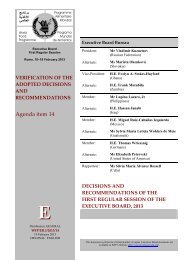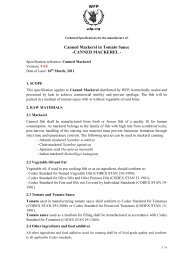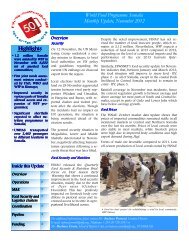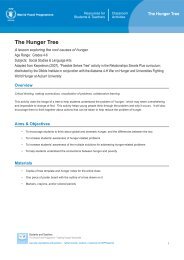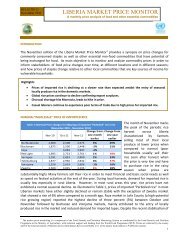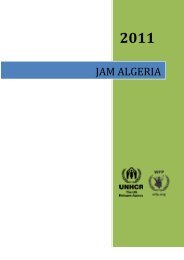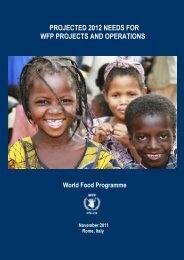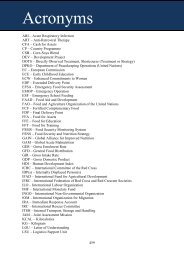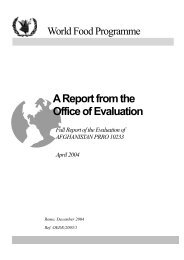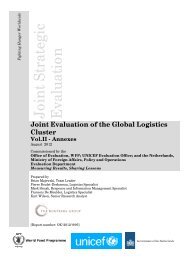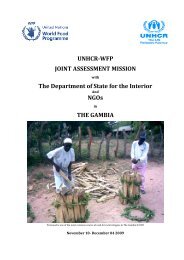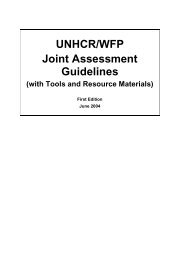Full Report - WFP Remote Access Secure Services
Full Report - WFP Remote Access Secure Services
Full Report - WFP Remote Access Secure Services
Create successful ePaper yourself
Turn your PDF publications into a flip-book with our unique Google optimized e-Paper software.
<strong>Full</strong> <strong>Report</strong> of the Evaluation of the Kosovo EMOP 6040<br />
this had been done before for individual posts in some emergencies, it became the modus<br />
operandi in the Kosovo operation.<br />
One of the key decisions of the <strong>WFP</strong> management was the deployment of experienced senior<br />
staff. This sounds simple, but it is not. Other organisations were not able to do so. Most of the<br />
staff interviewed were positive about the approach but feared that the same people would then be<br />
deployed to any emergency situation coming up. The other question repeatedly raised was, what<br />
happened to the projects from which key staff were taken away?<br />
The issue of staffing in an emergency situation has been discussed within <strong>WFP</strong>. The Regional<br />
Office in Pristina has made a number of suggestions and recommendations in a working paper on<br />
“lessons learned”. The working paper outlines some of the main problems also raised in this<br />
evaluation. As the staffing issue is largely an internal management and organisational matter of<br />
<strong>WFP</strong>, we would like to cite the most essential ones from the working paper of the Regional Office:<br />
• Only five consultants and one SBA personnel were working in Kosovo during phase one.<br />
While their actual work was highly commended, there were some weaknesses in linking<br />
with Headquarters and understanding of <strong>WFP</strong> policy and procedures. There was clearly a<br />
lack of career <strong>WFP</strong> staff in an emergency operation of this magnitude.<br />
• During the staff deployment in phase two (to Albania and FYRoM) the approach was to<br />
send in voluntary staff and let their roles and the structures be determined once the staff got<br />
there. Duplication of functions and confusion of reporting lines added to the stress.<br />
• A corporate policy, roster and system for emergency staff deployment do not exist in <strong>WFP</strong>.<br />
• Thanks to the good will of many staff, <strong>WFP</strong> was able to deploy a full-mix of operational staff<br />
to Albania and FYRoM. The result was later praised as “A-team Approach” implying<br />
successful deployment of experienced staff.<br />
• For phase three the contingency plan for Kosovo predetermined the staff functions required<br />
and specified names of staff proposed to fill each post. OD/HR implemented this approach,<br />
enabling Kosovo operation to start off with full staffing of over 50 international staff.<br />
• Emergency operations require varied skill sets of staff to make it run, particularly in the<br />
start-up phase. <strong>WFP</strong> human resources policy does not sufficiently recognise this reality and<br />
maintains the old Unified Service type profile as the favoured “core” profile.<br />
• The current roster system does not identify the required skills for emergency operations.<br />
• Many TDY staff raised concern over their status in their home posts and being inadvertently<br />
penalised for volunteering.<br />
• Managers hesitate to release international staff (for emergency operations) due to minimal<br />
staffing in HQ and COs.<br />
• Other problems and constraints related to unclear R&R policy, DSA/MSA and other<br />
entitlements of international staff related to contractual status and support to families left<br />
behind.<br />
• With regard to local staff: <strong>WFP</strong> has neither proper contractual tools nor administrative<br />
capacity to manage local staff. The limitation of SSAs places <strong>WFP</strong> in disadvantage in<br />
attracting local staff. Even where UNDP does exist to offer other types of contract, it is no<br />
longer realistic to rely on UNDP services where <strong>WFP</strong> local staff out-numbers UNDP staff by<br />
hundreds.<br />
Recommendations:<br />
• Establish a policy that strategically places career staff in emergency operations, and reduce<br />
heavy dependency on consultants. <strong>WFP</strong> career staff will need to augment their emergency<br />
experience and management skill.<br />
• Establish a corporate policy on emergency staff deployment so that all <strong>WFP</strong> staff is ready in<br />
principle to participate. A template reflecting staff functions required for a typical emergency<br />
start-up phase should be developed.<br />
• <strong>WFP</strong> should consider a rotation system for rapid deployment. Core team should consist of<br />
staff with different skill sets. To avoid dependency on the same staff, the team should<br />
25


